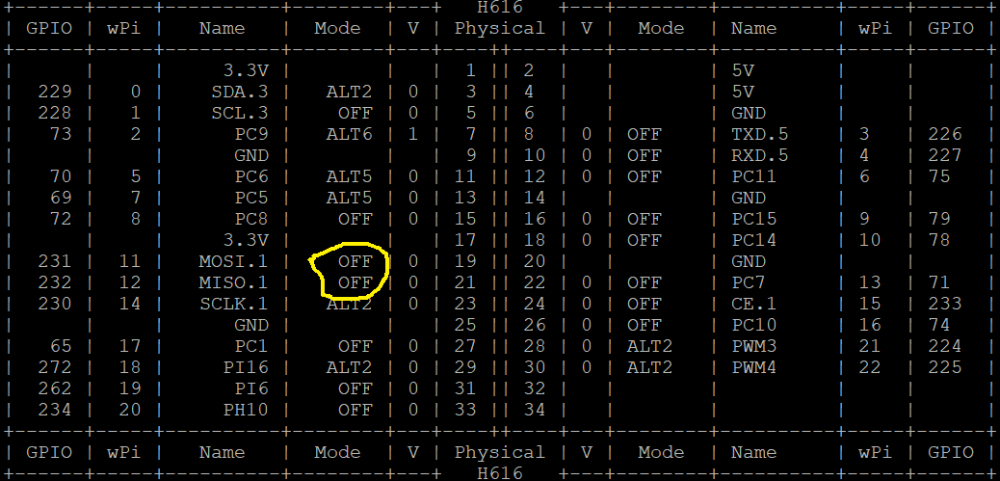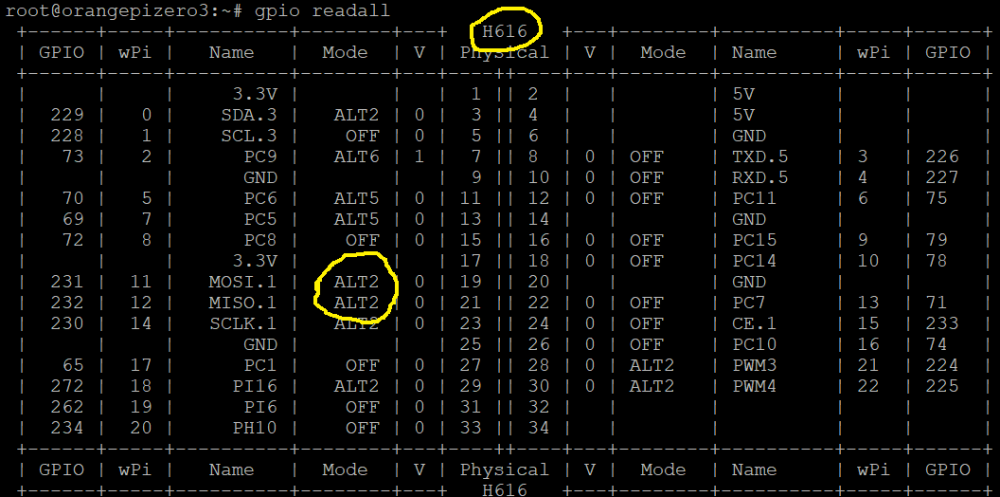Active threads
Showing topics posted in for the last 365 days.
- Today
-
@usual user@Efe Çetin it seem to work with i burned an sd card with the new compiled Armbian-unofficial_24.8.0-trunk_Orangepi5-plus_bookworm_legacy.5.10.160 image . I boot from the sdcard It seems to work as i have no crash copying a 250GB file between a usb ssd and the mvne. I'm trying now memtester 31G. ... ... trying mlock ...Killed BUT not crash trying memtester 30G is working ... ... and it does not crash. @Efe Çetin Is it possible to make the official release working for the 32Gb version ?
-
I can add that Orange Pi Zero 3 users have similar problems, i.e. after turning on the power or, for example, after reboot. This is not a cyclical phenomenon. So when it happens that you need to reboot remotely, it may turn out that Orange Pi Zero 3 requires physical intervention by turning the power on and off.
-

All Armbians with Kernel 6.8.x woun't start on Radaxa Rock 5b
Werner replied to Tomogo's topic in Radxa Rock 5B
https://debug.armbian.de -
Hi, I do not konow, it this is the right place to raise the this ticket. But in stable releases of Armbian it works fine, but there is no video acceleration. I have tried Kodi on Armbian Noble Gnome + trunk MESA/VPU: Armbian_24.8.0-trunk.85_Rock-5b_noble_vendor_6.1.43_gnome-oibaf_desktop.img Kodi falling when I'm trying to install some of extensions. For example https://repo.sc2.zone/ Crash log in the attachment. System log: 2024-06-05T12:01:28.534687+02:00 rock-5b kodi.desktop[3739]: Fatal Python error: PyImport_AppendInittab: PyImport_AppendInittab() may not be called after Py_Initialize() 2024-06-05T12:01:28.535024+02:00 rock-5b kodi.desktop[3739]: Python runtime state: initialized 2024-06-05T12:01:28.535112+02:00 rock-5b kodi.desktop[3739]: Thread 0x0000ffff3afde0c0 (most recent call first): 2024-06-05T12:01:28.535191+02:00 rock-5b kodi.desktop[3739]: <no Python frame> 2024-06-05T12:01:28.612980+02:00 rock-5b kodi.desktop[3732]: Aborted 2024-06-05T12:01:28.640388+02:00 rock-5b kodi.desktop[3732]: Crash report available at /home/tomogo/kodi_crashlog-20240605_120128.log kodi_crashlog-20240605_115433.log
-

Issue with UART Configuration on OrangePi Zero 2 Board
Dmytro Lazor replied to Dmytro Lazor's topic in Orange Pi Zero 2
Hello @ALIGMSTEN, I want to use UART5, which is located on the TX-PH2 and RX-PH3 pins. As far as I understand, this UART is initially disabled. To enable it, I tried using the command armbian-config -> System -> Hardware, but I couldn't do it because nothing was displayed in the graphical interface (as shown in the screenshot above). After doing some research, I started experimenting with the /boot/armbianEnv.txt file. I added the line overlay_prefix=sun50i-h616. After rebooting the board, I tried using armbian-config -> System -> Hardware again, and now the interface displays the hardware peripherals along with the UART5 that I need. By enabling it, I can receive data through the TX-PH2 and RX-PH3 pins via /dev/ttyS1. So, I have essentially solved my problem, but I still have a few questions: Is there a simpler or recommended way to enable UART5 on this board without manually editing the /boot/armbianEnv.txt file? Are there any potential issues or pitfalls I should be aware of when using this method? Is it a bug that the interface in armbian-config -> System -> Hardware did not display initially on various versions of the system? Thank you. -
Hi, I've installed Armbian_24.5.1_Rock-5b_bookworm_vendor_6.1.43_cinnamon_desktop.img on my Rock 5b and when I have tried to do apt update get error message with armbian.com url. (timeout error) I did all necessary and now it work fine. But for dev info, there is some problem probably with all Stable images.
-

CSC Armbian for RK3318/RK3328 TV box boards
Борис Макаров replied to jock's topic in Rockchip CPU Boxes
Many thanks to all those who helped me launch the TV-box, I am very grateful to these people who help out newcomers with their advice. Thanks jock, I deleted brltty using the command: and oh, a miracle the board worked, the connection to the printer took place! -
No matter which DTB I use, HDMI doesn't respond. What's going on?
-
Hello! Can't say if a step is missing, normally an sdcard with multitool on it is sufficient to let it boot from sdcard. I don't know if you have an ancient version installed without the sdcard boot or a very new installation with the missing feature in u-boot. You may take a look to this:
-

Hope to get rtl8852be wifi driver support for kernel 6.1
Tony3 replied to Gypsophila .'s topic in Orange Pi 5 Plus
Then compile it by yourself? -
Do you have a TV with hdmi port? Maybe these links can help. https://forums.raspberrypi.com/viewtopic.php?t=353936&start=50 https://forums.raspberrypi.com/viewtopic.php?t=24679&start=225
-
Sorry, I haven't got time to tinker with it. I'm staying with vendor kernel and trying to get nextcloud running, so 6.8 is not a priority for me now. I don't think it's possible to just add this overlay at boot time. I wanted to recompile the kernel with modified dts and then include this overlay. Why I think it's necessery is because of the __symbols__ node in decompiled versions of dtb's. 6.1 dp0_in_vp1 = "/dp@fde50000/ports/port@0/endpoint@1"; dp0_in_vp2 = "/dp@fde50000/ports/port@0/endpoint@2"; dp0_out = "/dp@fde50000/ports/port@1/endpoint"; hdcp1 = "/hdcp@fde70000"; hdmi0 = "/hdmi@fde80000"; hdmi0_in = "/hdmi@fde80000/ports/port@0"; hdmi0_in_vp0 = "/hdmi@fde80000/ports/port@0/endpoint@0"; hdmi0_in_vp1 = "/hdmi@fde80000/ports/port@0/endpoint@1"; hdmi0_in_vp2 = "/hdmi@fde80000/ports/port@0/endpoint@2"; edp0 = "/edp@fdec0000"; edp0_in_vp0 = "/edp@fdec0000/ports/port@0/endpoint@0"; edp0_in_vp1 = "/edp@fdec0000/ports/port@0/endpoint@1"; edp0_in_vp2 = "/edp@fdec0000/ports/port@0/endpoint@2"; dp1 = "/dp@fde60000"; dp1_in_vp0 = "/dp@fde60000/ports/port@0/endpoint@0"; dp1_in_vp1 = "/dp@fde60000/ports/port@0/endpoint@1"; dp1_in_vp2 = "/dp@fde60000/ports/port@0/endpoint@2"; dp1_out = "/dp@fde60000/ports/port@1/endpoint"; hdmi1 = "/hdmi@fdea0000"; hdmi1_in = "/hdmi@fdea0000/ports/port@0"; hdmi1_in_vp0 = "/hdmi@fdea0000/ports/port@0/endpoint@0"; hdmi1_in_vp1 = "/hdmi@fdea0000/ports/port@0/endpoint@1"; hdmi1_in_vp2 = "/hdmi@fdea0000/ports/port@0/endpoint@2"; edp1 = "/edp@fded0000"; edp1_in_vp0 = "/edp@fded0000/ports/port@0/endpoint@0"; edp1_in_vp1 = "/edp@fded0000/ports/port@0/endpoint@1"; edp1_in_vp2 = "/edp@fded0000/ports/port@0/endpoint@2"; 6.8 sys_grf = "/syscon@fd58c000"; hdptxphy0_grf = "/syscon@fd5e0000"; hdmi0 = "/hdmi@fde80000"; hdmi0_in = "/hdmi@fde80000/ports/port@0"; hdmi0_in_vp0 = "/hdmi@fde80000/ports/port@0/endpoint"; hdmi0_out = "/hdmi@fde80000/ports/port@1"; hdmi0_out_con = "/hdmi@fde80000/ports/port@1/endpoint"; vop_grf = "/syscon@fd5a4000"; vo0_grf = "/syscon@fd5a6000"; vo1_grf = "/syscon@fd5a8000"; usb_grf = "/syscon@fd5ac000"; And overlay patches __fixups__ { hdmi0_in_vp0 = "/fragment@0:target:0"; hdmi0_in_vp1 = "/fragment@1:target:0"; hdmi1_in_vp0 = "/fragment@2:target:0"; hdmi1_in_vp1 = "/fragment@3:target:0"; }; 6.8 does not even have hdm1* nodes, so we either need to somehow change the overlay or modify dts and rebuild kernel
- Yesterday
-
Checking that note reveals: Note: at the current status, helios64 board patches have been disabled because the base device tree does not apply on kernel 6.9. So helios64 is cancelled as of linux 6.9.x until someone takes care of the issue. Thank you very much.
-

Efforts to develop firmware for H96 MAX V56 RK3566 8G/64G
Hqnicolas replied to Hqnicolas's topic in Rockchip CPU Boxes
Original Post: @rna Install dependency sudo apt-get install git cmake cabextract gcc-arm-linux-gnueabihf libc6-dev-armhf-cross to enable armhf sudo dpkg --add-architecture armhf sudo dpkg --add-architecture arm64 sudo touch /etc/apt/sources.list.d/arm-cross-compile-sources.list # Add the default sources to that list with the architectures (armhf, arm64) prefixed as such: deb [arch=armhf,arm64] http://ports.ubuntu.com/ focal main restricted deb [arch=armhf,arm64] http://ports.ubuntu.com/ focal-updates main restricted deb [arch=armhf,arm64] http://ports.ubuntu.com/ focal universe deb [arch=armhf,arm64] http://ports.ubuntu.com/ focal-updates universe deb [arch=armhf,arm64] http://ports.ubuntu.com/ focal multiverse deb [arch=armhf,arm64] http://ports.ubuntu.com/ focal-updates multiverse deb [arch=armhf,arm64] http://ports.ubuntu.com/ focal-backports main restricted universe multiverse Update /etc/apt/sources.list to include your default architecture deb [arch=amd64] http://us.archive.ubuntu.com/ubuntu/ noble main restricted universe multiverse Compile and install box64 cd git clone https://github.com/ptitSeb/box64 cd box64 mkdir build cd build cmake .. -DRK3588=1 -DCMAKE_BUILD_TYPE=RelWithDebInfo; make -j4 make -j3 sudo make install sudo systemctl restart systemd-binfmt cd Install Wine on Bookworm cd cd ~/Downloads wget https://dl.winehq.org/wine-builds/debian/dists/bookworm/main/binary-amd64/wine-stable-amd64_6.0.2~bookworm-1_amd64.deb wget https://dl.winehq.org/wine-builds/debian/dists/bookworm/main/binary-amd64/wine-stable_6.0.2~bookworm-1_amd64.deb dpkg-deb -xv wine-stable-amd64_6.0.2~bookworm-1_amd64.deb wine-installer dpkg-deb -xv wine-stable_6.0.2~bookworm-1_amd64.deb wine-installer mv ~/Downloads/wine-installer/opt/wine* ~/wine rm -rf wine-installer cd or Install Wine on Jammy cd cd ~/Downloads wget https://dl.winehq.org/wine-builds/debian/dists/bullseye/main/binary-amd64/wine-stable-amd64_6.0.2~bullseye-1_amd64.deb wget https://dl.winehq.org/wine-builds/debian/dists/bullseye/main/binary-amd64/wine-stable_6.0.2~bullseye-1_amd64.deb dpkg-deb -xv wine-stable-amd64_6.0.2~bullseye-1_amd64.deb wine-installer dpkg-deb -xv wine-stable_6.0.2~bullseye-1_amd64.deb wine-installer mv ~/Downloads/wine-installer/opt/wine* ~/wine rm -rf wine-installer cd Create Symlink to Wine sudo ln -s ~/wine/bin/wine /usr/local/bin/wine sudo ln -s ~/wine/bin/wineboot /usr/local/bin/wineboot sudo ln -s ~/wine/bin/winecfg /usr/local/bin/winecfg sudo ln -s ~/wine/bin/wineserver /usr/local/bin/wineserver sudo chmod +x /usr/local/bin/wine /usr/local/bin/wineboot /usr/local/bin/winecfg /usr/local/bin/wineserver WINEPREFIX=~/.wine64 WINEARCH=win64 wine winecfg Create alias in .bashrc on HOME folder cd nano .bashrc # bashrc content: alias wine64="WINEPREFIX=~/.wine64 wine" --> then save (ctrl+x, choose yes) --> then logout & login Install Winetricks sudo apt-get install cabextract -y cd ~/Downloads && wget https://raw.githubusercontent.com/Winetricks/winetricks/master/src/winetricks sudo chmod +x winetricks && sudo mv winetricks /usr/local/bin/ Using Winetricks (ex: Corefonts & Dotnet 4) BOX64_NOBANNER=1 winetricks BOX64_NOBANNER=1 winetricks corefonts dotnet40 -
As they say, did you turn it off and on... he he Reboot helped, although I had only 8 days of uptime and in the meantime something caused some confusion. I speculate that it may be something related to cpu tool deprecated... or root@odroidxu4:~# apt list --upgradable Listing... Done armbian-bsp-cli-odroidxu4-current/bullseye 24.5.1 armhf [upgradable from: 23.8.1] N: There is 1 additional version. Please use the '-a' switch to see it However, using cpupower I was able to set 1.9 and 1.3Ghz, but setting it to 2.0 and 1.4 does not work even though cpupower provides such an option. I'm guessing it may be something deeper in the kernel set for this sbc?
-
Solved I had not configured the boot/extlinux/extlinux.conf file correctly. Sorry, enough to read carefully
-
For Ubuntu to say: code { font-family: Consolas,"courier new"; color: crimson; background-color: rgba(0, 0, 0, 0.2); padding: 2px; font-size: 105%; } do-release-upgrade One thing to mention is that code { font-family: Consolas,"courier new"; color: crimson; background-color: rgba(0, 0, 0, 0.2); padding: 2px; font-size: 105%; } do-release-upgrade usually does not work until the first point release. So retry once Ubuntu 24.04.1 has been released. Currently expected for August 15, 2024
-
Try this: https://github.com/armbian/build/pull/6694#pullrequestreview-2096146300
-
Thanks. I was not aware of that. I am amazed and glad that wifi works on my Tronsmart Vega S95 Telos with the S905 chipset. That's where I really needed it. The Minix was just an experiment.
-
I can say that a way has been found on a board to be able to run a minimal arch Linux distro. Unfortunately it is not easy and we are still in an initial testing phase. 1) Open the case and press the button located behind the audio jack during power on. At this point, use the USB male cable to load the modified image with Linux PC and Sunxi-fel utility to boot from USB. 2) Boot with a USB stick and USB keyboard hub and check that the Linux kernel starts. 3) Upload Linux image to eMMC. I am not at risk of carrying out point 2 and I will have to solder the cables for the serial port to understand where the problem is in my case. If there are any updates I'll let you know. If it is possible to create an image ready to be directly on emmc this could be within everyone's reach.
-

Orange pi zero 3 RTS CTS not working in python script
vtech replied to vtech's topic in Allwinner sunxi
I also tried adding line "param_uart2_rtscts=1" to "/boot/armbianEnv.txt". This enabled GPIO Mode ALT2 for UART2_RTS and UART2_CTS. However, still no voltage changes on RTS or CTS pin when tried to send data over TX. Looking forward for help. Thanks in advance. P.S.: WiringPi (https://github.com/orangepi-xunlong/wiringOP.git) does not seem to be working for Orange Pi Zero 3 as it is showing H616 in output of gpio readall command Regards. -
Today I did update my 3 NanoPi Neo2 via apt update/upgrade, but only one is accessable via ssh after the update. (without SSH/SSL-conect also no conection via SFTP/WinSCP because if the timeout) The one which is accessable has after the update Welcome to Armbian 23.02.2 Bullseye with bleeding edge Linux 6.7.12-edge-sunxi64 ( Machine model: FriendlyARM NanoPi NEO 2) The two other do show prompts for user/password but doesnt login via ssh - and after some time they time out and I can reenter user/password After connecting via TTL-serial I can also enter user/password and then the Neo2 shows me: _ _ ____ _ _ _ ____ | \ | | _ \(_) | \ | | ___ ___ |___ \ | \| | |_) | | | \| |/ _ \/ _ \ __) | | |\ | __/| | | |\ | __/ (_) | / __/ |_| \_|_| |_| |_| \_|\___|\___/ |_____| Welcome to Armbian 23.8.1 Bullseye with bleeding edge Linux 6.7.12-edge-sunxi64 No end-user support: community creations System load: 266% Up time: 2 min Memory usage: 22% of 982M IP: 192.168.6.24 CPU temp: 73°C Usage of /: 54% of 15G storage/: 56% of 458G storage temp: 41°C RX today: 4.2 GiB [ General system configuration (beta): armbian-config ] Last login: Tue Dec 27 14:13:30 +03 2022 from 192.168.6.17 on pts/0 After prssing Ctrl-C: ^C Armbian 23.8.1 bullseye ttyS0 npi-neo2-24 login: For non-existing users I do get a timeout at the serial-TTL-Port: npi-neo2-24 login: maxandmoritz Password: Login timed out after Armbian 23.8.1 bullseye ttyS0 npi-neo2-24 login: but nothing more - and this time the login doenst time out. But the armbian seems to boot up correctly, because the SAMBA-server on the Neo2 is available/useable. So the only way to change something in the system will be to make modifikations to the SDCard - but which change have I to do? Maybe its something between the Neo2 Revisions 1&2 (not/no Black Revision). Does anyone got a glue/idea for me? Thanks in advance Guido
-
https://github.com/raspberrypi/libcamera https://github.com/raspberrypi/picamera2 Ubuntu Noble already has this available; sudo apt install python3-libcamera










